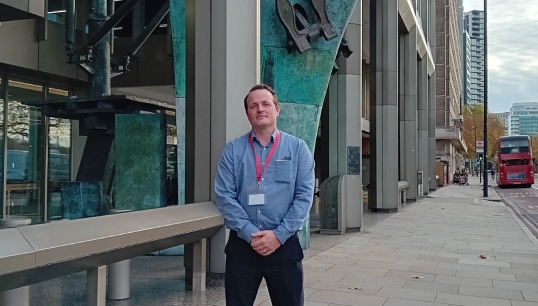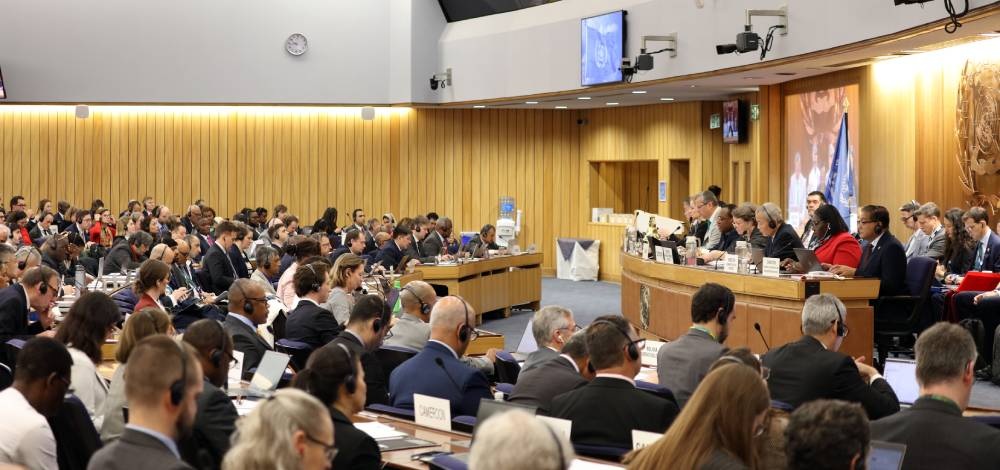- Topics
- Campaigning
- Careers
- Colleges
- Community
- Education and training
- Environment
- Equality
- Federation
- General secretary message
- Government
- Health and safety
- History
- Industrial
- International
- Law
- Members at work
- Nautilus news
- Nautilus partnerships
- Netherlands
- Open days
- Opinion
- Organising
- Podcasts from Nautilus
- Sponsored content
- Switzerland
- Technology
- Ukraine
- United Kingdom
- Welfare

Nautilus head of professional and technical David Appleton talks about the year in maritime healthcare, training and safety with Sarah Robinson – with some notable advances achieved for members
SARAH ROBINSON (SR): I'd like to start with a recent success that will mean a lot to many members in the UK, and that's what you did with the Dreadnought medical service. Can you tell us what the service is and what problems you were dealing with this year?
DAVID APPLETON (DA): The Dreadnought Medical Service is a priority medical service aimed at getting seafarers back to sea as soon as possible if they experience any medical conditions. The idea is, essentially, that the treatment should be faster than you would receive in your local NHS area.
However, that principle hasn't always worked, and there have been numerous problems over the years, including some funding issues that have prevented seafarers resident in Scotland and Northern Ireland from accessing the service. We've actually made several breakthroughs this year, which people can read about here.
SR: You also do a lot of work on cadet training – for example, influencing what goes in the syllabus at UK maritime colleges. What's been happening on that front in 2025?
DA: Members will be aware that the Maritime & Coastguard Agency (MCA) conducted a two-year project, which they called the Cadet Training & Modernisation programme. Nautilus was heavily involved in that project, and devoted significant resources to that.
The main result of that project was that the UK training syllabus was thoroughly revised and modernised, and we’re now in the process of implementing it. So, from September this year, all new cadets will be on the new revised syllabus – which, as far as is permitted within the scope of STCW, has brought the UK programme up to one standard with modern methods. It should hopefully mean that the training is much more relevant to what actually goes on onboard the ship.
Alongside that, through the Maritime Educational Foundation, we have secured support for UK colleges to invest in the equipment and systems needed to allow for that upgrade and modernisation.
There's been several other projects as well, notably the electronic training record book, which was rolled out alongside the modernisation of the syllabus. Again, the aim of that is to modernise the cadet training experience and take advantage of the additional functionality that’s available for a digital service rather than the old paper record book.
SR: Looking internationally, we're all aware of the dangers our members face in certain parts of the world, and it’s important for seafarers to have the right to refuse to transit high risk sea areas. How does Nautilus make that happen, and what is the situation at the moment?
DA: So members will obviously know that the recent instability and conflict in the Middle East has resulted in significant risks to shipping in the area, notably in the Red Sea. When these issues first came to light, Nautilus immediately engaged with shipowners in the UK and internationally to negotiate agreements to ensure seafarer safety in the region.
In the UK, we do this through the Warlike Operations Area Committee – WOAC – where it's ourselves, the RMT union and the shipowners that sit on that board.
We secured agreements for the Red Sea area and also for Israeli and Lebanese ports, and those agreements give seafarers the right to depart the ship prior to entering into those areas, at no detriment to themselves.
Although a ceasefire has recently been negotiated in Gaza, those WOAC agreements are still in place, because there is still significant uncertainty about how secure that situation is, and especially as to whether the risks associated with that in the Red Sea have abated. We've just recently renewed those agreements, and we will be closely monitoring the situation.

SR: As new fuels and technologies are introduced, it's vital that safety and training standards are put in place to ensure a Just Transition for seafarers. What work have you been doing nationally and internationally on this in 2025?
DA: The driving factor behind decarbonisation internationally is the International Maritime Organization, so we're obviously involved in discussions there about the targets and the standards have been put in place. But alongside that are several intertwining factors, the first one being the training for future fuels and technology, which is being discussed at the IMO's Human Element Training and Watchkeeping Committee in their ongoing revision of STCW.
However, that's obviously a long process, and we need to think about what happens in the interim. We don't want to develop national standards and training which then aren't compatible with what's agreed internationally, but we do need to get something in place.
So in the UK, through the Merchant Navy Training Board and in association with the MCA, we're addressing the barriers to ensuring that UK seafarers receive the training they need on fuels. One of the most significant ones is the fact that under the current training standards, you require sea time on a vessel burning low flashpoint fuel in order to become certificated to serve on this kind of vessel. As more and more ships burn future fuels and low carbon fuels, we imagine that's going to be a significant bottleneck. So we're looking at alternative means of meeting those requirements.
Alongside the training issues are the safety issues. So again, at the International Maritime Organization, they're undertaking a safety study of these fuels, and the safety standards are to be based on the findings of that study. We're participating in that to ensure that the seafarers' interests are given due consideration.
SR: As another technological issue, what have you been doing around Maritime Autonomous Surface Ships, or MASS?
DA: MASS is an issue we've been heavily involved in for quite some time now. The initial impetus behind it came in 2017 when a proposal was put forward to the International Maritime Organization to develop a regulatory framework to allow for the operation of MASS.
It's now almost at an end, and the initial step is to develop a non-mandatory code, mainly through the IMO's MASS Working Group and the intersessional meetings that have been held there.
The code is due to be adopted in May next year, and we've been quite successful in influencing the direction of travel. We did initially have some concerns that insufficient consideration was being given to human element issues and to protections that are in place onboard conventional ships. But we're now satisfied that the guidance which has been agreed so far is actually fit for purpose.
Then, nationally, there have been several MASS projects and work streams that we've been involved in. The main one was to introduce a training regime for remote operators of small vessels in UK coastal waters, and we have established the principle that seafarers operating MASS should be qualified to operate the equivalent vessel of that size in the conventional sense.
SR: Have you got anything else that you'd like to tell members about the Professional and Technical team's work this year?
DA: I think I'd just like to draw attention to the Nautilus Professional and Technical Forum, which we hold three times per year. That's open to all members, and gives people the opportunity to hear updates on the work that we're carrying out and also to raise issues and discuss them with likeminded maritime professionals.
We would encourage anybody who's interested in the issues we've been talking about today to look out for an invite and to come along to those meetings.
I'd also say that if you need to get in touch with us as a member, then you can email protech@nautilusint.org.
Tags
More articles
Premium protection for members
Dreadnought update: progress for Union on recovering disrupted seafarer medical service
Nautilus International's longstanding campaign to protect the Dreadnought seafarer health service has led to progress at the highest levels of government.
UK Branch Conference: Members agree that private healthcare motion needs a second look
A motion on negotiating private healthcare for members has been remitted for further consideration by a vote at the 2025 Nautilus UK Branch Conference.
